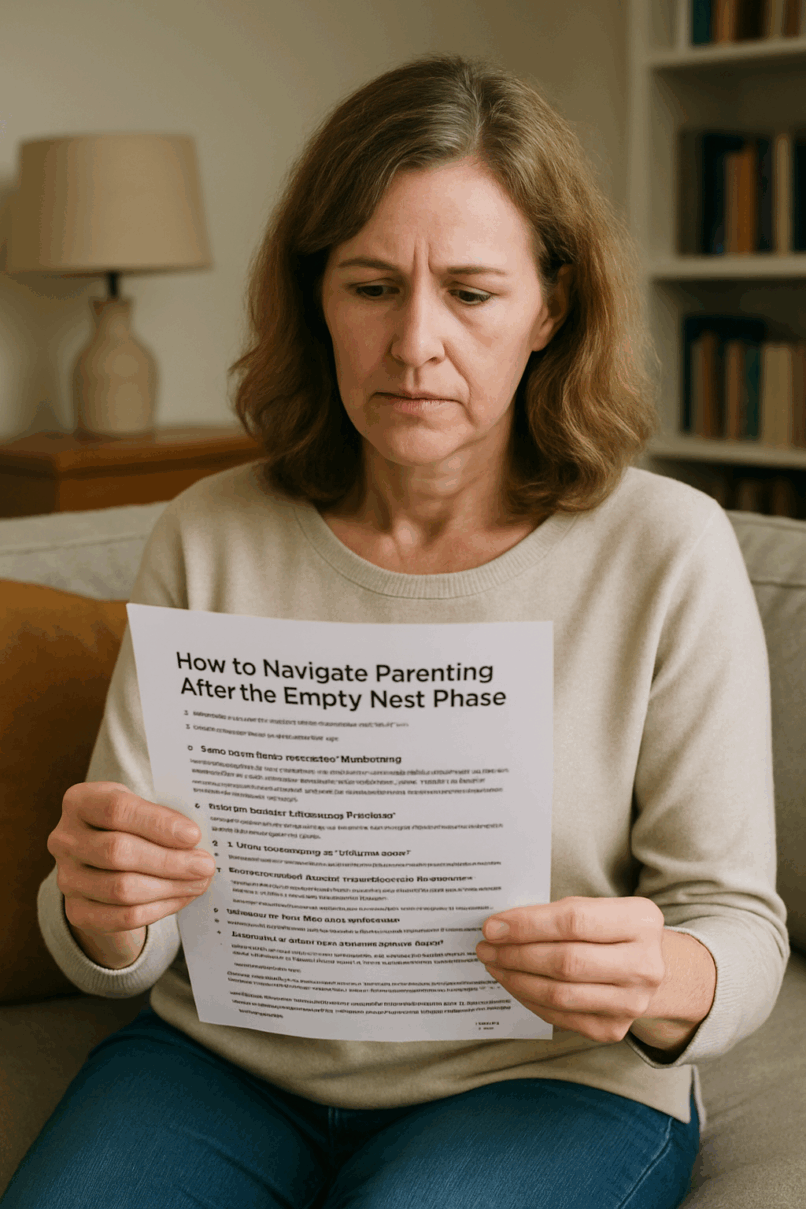
simply amazing, always for you.
Navigating parenting after the empty nest phase can be both liberating and emotionally challenging. When children leave home—whether for college, work, or their own families—parents often face a major shift in identity, daily routine, and relationship dynamics.

1. Understand the Emotional Landscape
➤ Grieve the Change, and Give Yourself Permission to Feel
- It’s normal to feel a mix of sadness, pride, loss, and relief.
- You’re not just missing their physical presence—you’re adjusting to the end of a chapter.
- Don’t rush your emotions. Accept them.
➤ Watch for Empty Nest Syndrome
- Signs include persistent sadness, anxiety, lack of purpose, or even depression.
- If symptoms linger, consider speaking to a therapist or counselor.
2. Redefine Your Role as a Parent
➤ Shift from Manager to Mentor
- Your children no longer need you to oversee their day-to-day life.
- But they do need a trusted advisor—someone to talk to, lean on, or seek wisdom from.
- Practice active listening instead of offering unsolicited advice.
➤ Respect Their Boundaries
- Give them space to grow without feeling abandoned.
- Ask before visiting, and avoid micromanaging from afar.
3. Reconnect With Your Identity
➤ Rediscover Who You Are Beyond Parenthood
- What did you love doing before parenting took center stage?
- Reinvest time in hobbies, travel, fitness, social circles, or volunteering.
- Consider learning a new skill, joining a club, or taking a class.
➤ Reignite Your Relationship (If You’re in One)
- Many couples find this is a great time to rebuild intimacy and do things together.
- Plan dates, trips, and projects that excite you both.
- If you’re single, this is an opportunity to redefine your future on your terms.
4. Stay Connected—But Let Them Lead
➤ Use Technology Wisely
- Text, call, or video chat—but let your child initiate some of the communication.
- Send updates about your life, not just questions about theirs.
➤ Be Their Cheerleader, Not Their Supervisor
- Celebrate their wins, encourage them when they struggle, and avoid “helicoptering.”
5. Cultivate a New Routine
➤ Structure Your Days with Purpose
- Create a routine that gives you a sense of meaning and productivity.
- Include social activities, exercise, creative time, or spiritual practices.
➤ Consider Downsizing or Redesigning Your Home
- Some empty nesters find peace in decluttering, remodeling, or even moving to a new location.
- This physical shift can reflect your emotional and lifestyle transformation.
6. Focus on Intergenerational Growth
➤ Invest in Extended Family Roles
- You might now become a grandparent, aunt/uncle-figure, or mentor.
- Being present in these new roles can bring deep satisfaction and joy.
➤ Share Family Traditions Creatively
- Keep family traditions alive by adapting them for new schedules or virtual celebrations.
- Host family Zoom dinners, plan reunions, or compile a family recipe book.
7. Watch for the Trap of Overcompensation
➤ Avoid Clinging or Guilt-Tripping
- Your child’s independence is not a rejection of your parenting—it’s the fruit of it.
- Don’t guilt-trip them into visiting or over-invest in their lives to avoid your own void.
➤ Don’t Over-Fill the Void Too Fast
- Jumping into intense commitments, new relationships, or major life changes impulsively may backfire.
- Reflect and make intentional choices.
8. Embrace Lifelong Parenting with Maturity
➤ Be Available, But Not Intrusive
- Adult children appreciate nonjudgmental support, not control.
- Share wisdom without pushing it.
➤ Recognize Their Adulthood
- Treat them like the adults they are. Ask for their opinions, include them in big decisions, and expect mutual respect.
9. Give Back to the Community
➤ Volunteer or Mentor Others
- Your experience is valuable—consider mentoring young adults, volunteering at schools, or helping other parents transition.
➤ Support Other Empty Nesters
- Start or join a support group to share your journey and stay socially connected.
10. Plan for the Future—Yours and Theirs
➤ Financial and Legal Preparation
- Review retirement plans, health coverage, and estate documents.
- Talk to your kids about your wishes, legacy, and plans openly and calmly.
➤ Enjoy Your Freedom Without Guilt
- You’ve done the heavy lifting of parenting. Now it’s time to build a life that excites you.
In Summary
The empty nest phase is not the end of parenting—it’s an evolution into a new chapter. One where respect, independence, and maturity define your relationships. By focusing on self-discovery, growth, and purpose, you’ll find not just peace but new possibilities.
What part of the empty nest phase are you finding most challenging—or surprisingly joyful? Let’s talk about it.
SUGGESTED READS
- How to Handle Puberty with Your Teenager: A Complete Parent’s Guide
- How to Transition Your Baby from Crib to Bed: A Gentle Yet Effective Guide for Parents
- How to Teach Your Kids About Gratitude During the Holiday Season
- How to Manage Parenting and Holiday Trips: The Ultimate Guide for Stress-Free Family Travel
- Ultimate Guide to Parenting During the Holiday Season: Keep the Joy, Ditch the Stress
- How to Make Your Child’s Birthday Truly Special: A Complete Guide to Unforgettable Memories

Support Our Website!
We appreciate your visit and hope you find our content valuable. If you’d like to support us further, please consider contributing through the TILL NUMBER: 9549825. Your support helps us keep delivering great content!
If you’d like to support Nabado from outside Kenya, we invite you to send your contributions through trusted third-party services such as Remitly, western union, SendWave, or WorldRemit. These platforms are reliable and convenient for international money transfers.
Please use the following details when sending your support:
Phone Number: +254701838999
Recipient Name: Peterson Getuma Okemwa
We sincerely appreciate your generosity and support. Thank you for being part of this journey!
